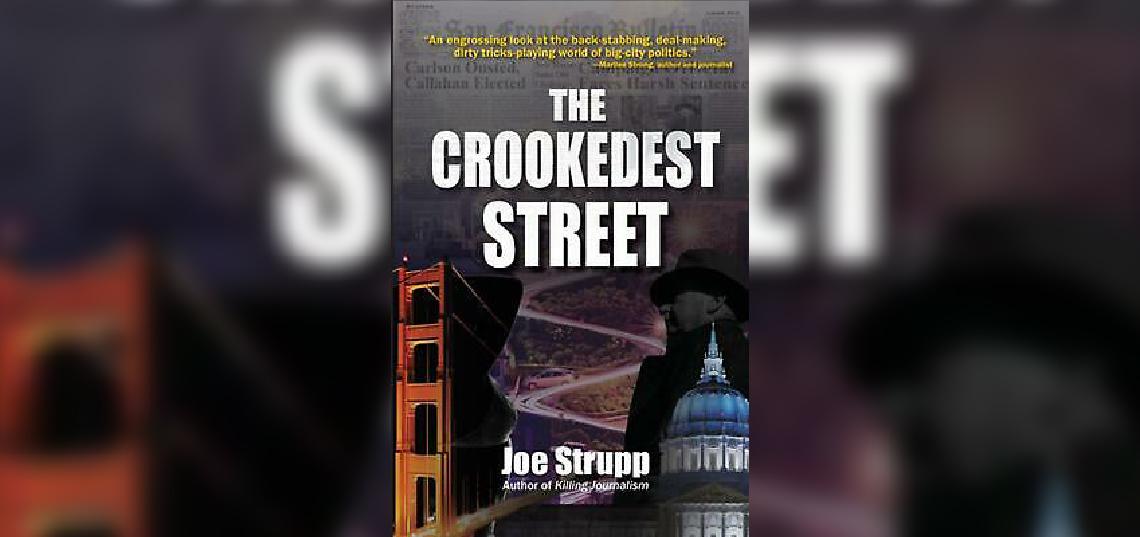
SC&I Part-Time Lecturer Joe Strupp has published his newest book, “The Crookedest Street,” an account of the political and press landscape of San Francisco in the 1990s, as told through the eyes of his characters who are fictional but are based upon real events and people Strupp encountered during his experiences working as a reporter in San Francisco during that period.
At the time, Strupp said, San Francisco, as a metropolitan center of business and culture in California, was a “raging political center and a battling news center.” Politics in the city were influenced by the LGBT community, growing Hispanic and Asian communities, and the AIDS epidemic.
Writing the book “was fun,” Strupp said, “because I used a lot of basic true stories and played up things to make them a little more interesting and a little more fun to write about.”
Some of the real events that set the scene include the Hunter’s Point Shipyard contamination, the threat of the San Francisco Giants moving out, local politics, and the battles between competing newspapers. Strupp called the book a “roller coaster ride through news and politics capturing what I think is an interesting era in my favorite city.”
Strupp began working on the manuscript 20 years ago, then set it aside for years and then finished it recently.
He describes his writing process as “Taking real characters and making them fictional and putting them into situations that maybe I as a critic would have liked to see.”
“A lot of people don’t know what government or journalism does,” Strupp said. “’The Crookedest Street’ shows the power public officials have and the news media has and how it can be misused and how it can be properly used.”
Two characters from the book that highlight this are Billy Dale, the political consultant, and Penny, the reporter. “Billy is an interesting example of the real corrupt and power-hungry elements that run big and small government,” Strupp said.
On the other hand, “Penny looks into something that people aren’t really looking into - she has a feeling there’s more to the story than is being told, so she pokes around to uncover something,” Strupp said. “I think all good reporters have a skepticism to them.”
Strupp has worked as a journalist for the last 30 years, so he has experienced the shift in journalism from print newspapers to the rise of digital media. In the early 90s, when he worked for The San Francisco Independent, which ran three times a week, the focus of journalism in San Francisco was mainly local. In addition to The Independent, daily and weekly papers covered local San Francisco neighborhoods and city government.
Explaining some of the differences between the media industry then and now, Strupp said back then even broadcast news channels borrowed stories from the front pages of newspapers, giving the print media power to decide which news people were exposed and what was considered news.
Today, digital media has taken over the newspaper industry, and The San Francisco Independent ceased publication in 2005. Strupp referred to the internet as a “necessary evil” because of the varying positive and negative effects it has had on the journalism industry. “The internet helps print papers continue online, but they aren’t making the money they used to because of the way advertising on the Internet is calculated,” he said. “There is also a rush to break stories because of the Web; There isn’t as much review or checking sources.”
After having worked as a reporter for so many years, Strupp said he has seen some of the most significant issues facing the news industry, and some of them are “loss of revenue for news outlets, consolidation, big advertising cutbacks, and the Internet.”
Strupp said he strives to communicate these issues and share his experiences as a reporter with his students at SC&I, where he teaches Writing for Media.
“A lot of our students weren’t alive in the 90s and things have changed so much in the business,” he explained. “They might read the book and think, ‘Wow, it was really like this back then?’”
Currently working as a reporter for the Asbury Park Press, Strupp said, “being a reporter has been and still is one of the most important professions in our nation.”
Strupp has written non-fiction books on politics and journalism, most recently “Killing Journalism: How Greed, Laziness (And Donald Trump) Are Destroying News And How We Can Save It.” He is currently working on two crime novels: one on a local unsolved murder, and the other on a murder that happened in his own family.
Discover more about the Journalism and Media Studies Department on the Rutgers School of Communication and Information website.
